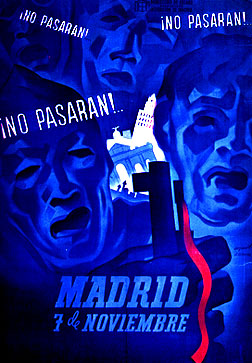frontline 6
The Spanish Civil War - a reply to Mike Gonzalez

In Frontline 4 Mike Gonzalez reviewed Spain Betrayed :the Soviet Union in the Spanish Civil War. In the following reply , William Bonnar takes a different view of the role the Soviet Union played in one of the key events of the 20th century.
Mike Gonzalez, in his review of Spain Betrayed : the Soviet Union in the Spanish Civil War, raises some interesting points; interesting but highly questionable. His approach betrays flaws characteristic of his particular brand of Trotskyism; the gross simplification of often highly complex situations in order to fit a pre-ordained political view of the world, and when the forces of the Left are defeated the search for scapegoats.
Mike's and the authors' view of the Soviet Union are clear-cut. The Soviet Union was an essentially counter-revolutionary state whose main interventions in the world were to subvert genuine revolutionary movements. In Spain, their role was to undermine and ultimately defeat the revolutionary and republican forces, no doubt as part of a deal to forge an alliance with the West. In reality, with Spain and elsewhere, Soviet foreign policy was always a much more complex animal, driven by often contradictory objectives. At the heart of this contradiction was the balance between defending and extending Soviet national interests and promoting and supporting the international struggle for socialism and against imperialism. Often the former won out at the expense of the latter, as graphically illustrated with the Soviet role in the Greek Revolution at the end of the Second World War. Although here as elsewhere the main blame for this defeat lay with the Left in Greece, not with the Soviet Union. There are equally many examples where the Soviet Union played a key role in support of the struggle for socialism and national liberation, as in the military, financial and political support given to the people of Vietnam in their war against the United States. The 1930's also saw the exporting of internal Soviet conflicts into the international arena. Part of the intense repression in the Soviet Union at that time was directed against 'Trotskyist and anarchist counter-revolution'. The eradication of the 'Trotskyist and anarchist menace' in foreign conflicts was one of the more bizarre aspects of that particular era.
In specific and intense international conflicts like the Spanish Civil War, both factors came into play. On the one hand the Soviet Union did give substantial military and diplomatic support to the Republican forces during the Civil War. The guns, bullets, tanks and ultimately aircraft, which came from the Soviet Union, were not a figment of imagination; they were very real and played an important role in the struggle for Republican forces starved of supplies by a Western embargo. As was the economic and diplomatic support given to the Republican government. This support should have been more, but that is a separate discussion. At the same time the Soviet Union was involved in an intense diplomatic offensive to isolate Nazi Germany. Fearing an immanent German attack it wanted to forge an international alliance involving the Soviet Union, France and Britain and did not want the Left in Spain doing anything to undermine that initiative. The Soviet Union also urged the Communist Left to carry out the struggle against particularly the anarchist 'counter-revolutionaries'. Of course, what didn't help in this situation were anarchist activities which did undermine the military struggle against fascism, a struggle of which the Communist Party increasingly formed the backbone. Herein lay the contradictions. As for trawling round Soviet archives. What is emerging is that these archives are so wide-ranging and contradictory that they can be used to justify almost any political position. In fact, they have recently revealed a Soviet plot to have Franco assassinated.
Of course all of this is now an interesting historical discussion among socialists now united on the same side of the barricades. Of more concern are Mike's references to the International Brigaders, particularly those who formed the British Brigade. In his article Mike refers to them as 'ordinary men and women who volunteered out of solidarity and rage', i.e. noble but naïve, and quotes the book's authors in their description of the International Brigades as 'in effect a Soviet army within Spain'. What utter nonsense. Earlier he argues that 'our version of events was usually rejected in the storms of moral outrage that came from the International Brigade Veterans' Associations and the Communist Parties to which most of them belonged'. I think this would be greeted not somuch by moral outrage as by outrageous laughter.
Mike has obviously never met any International Brigaders. I have. Over the past 20 years or so I have had the privilege of meeting many of the veterans, sadly not too many are left now. Then and now they might have been many things, but never naïve nor a Soviet proxy army. They knew exactly why they were going to Spain, to fight fascism and to stand shoulder to shoulder with the Spanish people in their hour of greatest need. They were and are committed, intelligent and insightful, heroes every one. My own family background is intertwined with this struggle. My uncle Andrew Bonnar was killed at the Battle of Jarama, while my father and another uncle were both arrested trying to board a ship in Southampton trying to join up. What often struck me was that rather than becoming disillusioned by the defeat in Spain, most went on to devote the rest of their lives to the cause of socialism. The International Brigaders from Britain and across the world were a heroic product of a heroic period for the Left and should be recognised as such. It was the greatest piece on international solidarity the world has ever seen. If socialists today showed the same degree of courage, insight and confidence in the future as these wonderful men and women our ultimate prize would be that much closer.